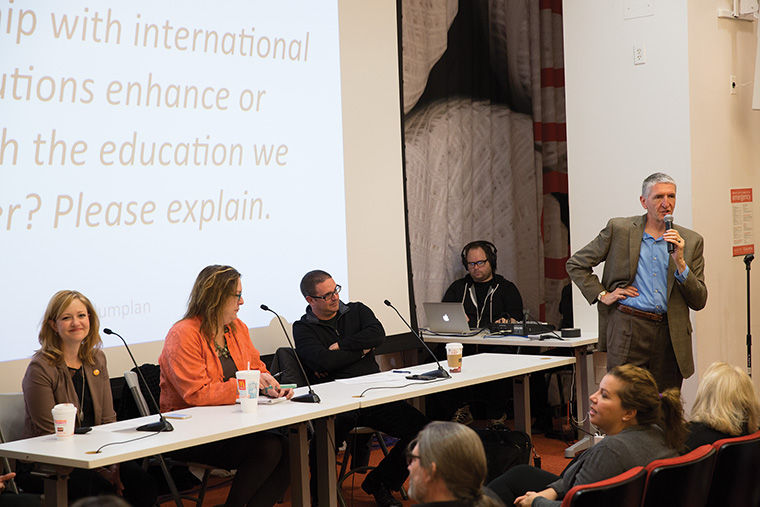Strategic Plan sessions kick off at Columbia
November 10, 2014

Students, faculty and administrators contributed opinions on Nov. 5 at Ferguson Auditorium in the 600 S. Michigan Ave. Building at the first of six roundtable discussions.
A series of roundtable discussions designed to attract input from students, staff and faculty kicked off Nov. 5 when attendees began weighing in on issues the college faces as it drafts its strategic plan.
More faculty and staff members than students filled Ferguson Auditorium in the 600 S. Michigan Ave. Building to attend a session titled “Optimizing Enrollment,” a discussion aimed at addressing the college’s decline in enrollment.
As reported Sept. 24 by The Chronicle, enrollment at the college has dropped 6.9 percent over the past year. According to a Sept. 17 report from the Office of Institutional Effectiveness, the college had 10,142 undergraduate students enrolled in Fall 2013 compared to 9,442 undergraduates in Fall 2014.
Attendees also talked about issues pertaining to attracting international students, recruiting more high school students, rigor in classes and the application process. The roundtable was also live-streamed on YouTube so students and faculty unable to make the commute to campus could still view the discussion live and tweet their opinions to the moderator on Twitter using the hashtag #columplan.
Stan Wearden, senior vice president and provost, is leading the initiative to draft and implement the strategic plan. He created the series of community discussions and also spearheaded the use of Civic Commons, an online stream where members of Columbia’s community can respond to questions from the roundtable and add input while also allowing feedback and responses to their posts. Wearden said Civic Commons is a way for the discussion to continue even after the 90-minute event.
Although Wearden said he was delighted with the turnout and is glad Columbia is an engaged community, he said the student turnout was not as high as he hoped. A variety of opinions will make the sessions a success, he added.
“I hope [attendees] give us a wide range of feedback in many different roles at the college,” Wearden said. “Whether they’re students or faculty, staff [or alumni], all points of view matter.”
As far as making the discussions available for everyone on campus to attend, Wearden said he hopes the transparency the administration is working to cultivate strengthens feelings of trust and respect among the campus community.
“[Making these discussions open] really highlights the fact that we see ourselves as one single institution with many different voices, and we want to make sure that we hear and respect those many different voices in a safe space to speak,” Wearden said.
John Green, interim dean of the School of Fine and Performing Arts, said open discussions will foster a positive image for the college.
“I think what we’re doing is quite unique,” Green said. “[The discussions] are giving everybody a voice so that nobody can say, ‘I wasn’t consulted,’ or, ‘I don’t know what’s happening.’ We are all able to contribute to this, and it’s a truly democratic process, which is great.”
Green also said there is a need for more student interaction at the discussions because students are the ones who are actually going through the process of what was described as “the new Columbia.”
“[The new Columbia] is emerging out of what we already have at the college and how we are positioning ourselves to be a highly effective and competitive institution going forward into the 21st century,” Green said.
Making the college more transparent is a positive and helpful move to better Columbia and its image, Green said.
“Something we and other colleges [haven’t done in the past] is make the purpose and mission of the college far more transparent so we share a common ground so that students particularly understand that as they are going through their education with us now, we’re actually looking to improve the quality of the education,” Green said.
Giving the college more of a community environment would create a better opportunity to tackle challenges head-on, Green said. Gathering input from around the campus helps administrators make decisions based on what the community is finding most important at the roundtable discussions, he added.
Peter Hartel, associate professor in the Cinema Art + Science Department, also attended the roundtable and said these discussions are beneficial to the college because they get everyone thinking about the same issues and give the campus community members a voice.
Hartel said he felt compelled to attend the event because optimizing the college’s enrollment at a time of decreased enrollment is a pressing issue.
“This session addresses the crux of whether we’re going to continue to be more open in our enrollment policies,” Hartel said. “[Optimizing enrollment is] a big issue, but we need to balance that with the historical nature of the college, serving the unserved and the under-served in higher education in arts and media and who gets access to that.”







